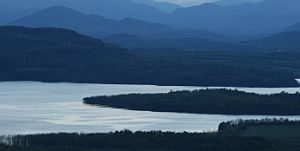
(Host) As the state faces criticism for the way it runs water quality programs, it’s considering letting the federal government take over the work.
The change from state to federal oversight could have an impact on Vermont companies. Instead of dealing with the state agency in Waterbury, local businesses would have to answer to officials in Boston.
VPR’s John Dillon reports:
(Dillon) The Clean Water Act – passed in 1972 – spells out a partnership between the state and federal government. The federal law sets the water quality benchmarks. But 46 states – including Vermont — run the actual permit programs under agreement with the U-S Environmental Protection Agency.
So, for example, when a Vermont company wants a permit to release pollution into a stream, it deals with officials at the state Agency of Natural Resources headquarters in Waterbury.
But the state may let the federal government take over – a process known legally as returning delegation to the EPA.
Jonathan Wood is secretary of the Agency of Natural Resources.
(Wood) “I think we’re doing a very good job here in Vermont. But there is continuing litigation relative to it. So we are very seriously looking at where the pros and cons are on all aspects of where the delegation fits.”
(Dillon) The litigation that Wood mentions was brought by the Conservation Law Foundation. The environmental group says the state agency has failed to protect Lake Champlain and numerous other water bodies around the state. The group is especially concerned that stormwater pollution and waste from farm fields continues to damage the Champlain watershed.
Last summer, C-L-F filed a petition asking EPA to take over unless the state improves its programs. Chris Kilian is C-L-F’s Vermont director.
(Kilian) “Ultimately, we want effective implementation of the Clean Water Act and other federal programs. The bottom line is that those programs should be implemented in order to protect our resources. And if the state’s not willing to commit to that, then we would want the federal government to step in.”
(Dillon) Pat Parenteau teaches environmental law at Vermont Law School and in the 1980s he was Vermont’s commissioner of environmental conservation. Parenteau says no state has ever voluntarily relinquished control of water programs back to the federal government.
But he says the unprecedented move will improve Vermont’s lakes and streams but could make life more difficult for businesses.
(Parenteau) “Unless ANR is willing to bring their program into compliance with the Clean Water Act, frankly it would be better from a resource standpoint to have EPA administering the Clean Water Act. It would not necessarily be better for the regulated community to have to deal with EPA at a distance.”
(Dillon) Parenteau says with EPA in charge, inspections and enforcement would be run by officials in Boston. The state would also get less federal money, since the feds pay for some of the Clean Water Act work.
(Parenteau) “So clearly the preferable course would be for Vermont to return to the days when it was a leader on these issues.”
(Dillon) Agency Secretary Jonathan Wood says the state is protecting the environment. He’s weighing the impact of federal oversight, including the financial cost to the state.
(Wood) “There are some moneys that come in from federal to do this program. But there are also some general fund moneys that are associated with that. And there has not been the appropriate amount of federal funding to implement the project. So that’s part – a very big part – of the decision-making.”
(Dillon) An EPA official says the agency has not yet had a detailed discussion with the state about taking over the water quality programs.
For VPR News, I’m John Dillon in Montpelier.